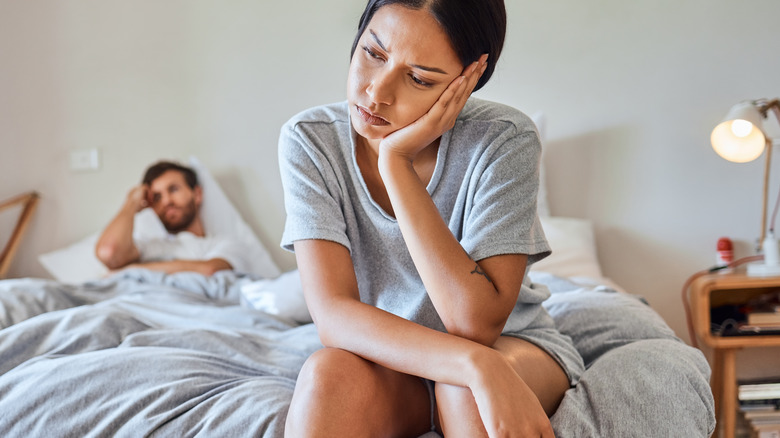When You Stop Having Sex, This Is What Happens To Your Early Death Risk
Movies portray sex as a feel-good, chemical-releasing, and exhilarating experience. Two people meet, maybe fall in love, relish each other's touch, and go on to spend an intimate night together where they come away feeling closer to one another.
There's some truth in these depictions. Sex does release a host of feel-good chemicals, the primary of which are endorphins and oxytocin. Endorphins are the neurotransmitters that are released in response to something pleasurable, like sex or eating your favorite food. They bring pain relief, reduce stress levels, and improve your mood. Oxytocin, also referred to as the "cuddle chemical" or "love hormone," is what enters your system when you hug someone you love or when you have an orgasm. It makes you feel close and connected to your partner. This is why when someone stops having sex, they may be prone to anxiety and depression.
Did you know that all of this can also be related to your longevity? Being chronically stressed, for instance, can reduce your life expectancy by 2.8 years, according to a 2020 study by the Finnish Institute for Health and Welfare, published in BMJ Open. People with moderate to severe depression tend to die 10 to 20 years earlier, per a 2023 study published in JAMA Network Open. In fact, frequent sex and early death risk have been studied specifically as well. A 2020 study published in The Journal of Sexual Medicine found that all-cause and cancer mortality risk was lower in middle-aged adults who had sex frequently than those who didn't. Let's take a closer look.
Sex reduces your risk of certain cancers
According to the American Cancer Society, around 1 in 44 men face prostate cancer-related death. What happens to your prostate when you stop having sex, then, is of importance. Per a 2016 study published in the journal European Urology, ejaculating more than 20 times in a month reduced the participants' (who were in their 20s and 40s) risk of prostate cancer by around 20%, when compared with the subjects who ejaculated just 4-7 times a month. A 2017 study published in Urologic Oncology: Seminars and Original Investigations had similar results for the 30- to 39-year-old participants.
Professor of epidemiology at Harvard T.H. Chan School of Public Health Lorelei Mucci (who was involved in the 2016 study), told Fatherly that one possible explanation is the prostate stagnation hypothesis, the idea that without frequent ejaculation (whether by sex or masturbation), men might accumulate potential carcinogenic secretions in their prostate, thereby increasing their risk of cancer.
Sex also offers early death-related protection for women. According to the director of sexual medicine at Alvarado Hospital, Dr. Irwin Goldstein (via Healthline), research shows that "women who have vaginal intercourse often have less risk of breast cancer than those who don't. [It's] pretty interesting and exciting and needs to be studied more," she said. Per statistics from the Centers for Disease Control and Prevention, around 42,000 women and 500 men die of breast cancer every year. Apart from cancer, having sex cuts your early death risk in other ways too.
How sex influences your immunity, heart health, and more
Your immune system is your first defense against sickness — from the common cold to cancer — and sex can be a key player here. There was a lower incidence of COVID-19 in people who had sex more than three times a month, when compared with those who engaged in the activity less than three times a month, according to a 2021 study published in the journal Fertility and Sterility. In a 2004 study published in Psychological Reports, researchers found that frequent sex was associated with higher levels of immunoglobulin A, an antibody blood protein found in your mucous membranes that fights off sickness.
Something also happens to your cardiovascular health when you stop having sex. Without the protective cortisol-lowering effect of sex, your blood pressure levels may increase. Sex is also a form of exercise, albeit small, but it can still help strengthen your heart. It protects your heart by helping you sleep better too. Several negative consequences are associated with lack of sleep, including poor lifestyle choices like eating unhealthy food and not exercising. Insomnia is also related to high blood pressure and cardiovascular disease. Having sex at least 52 times a year was associated with a 10% drop in heart disease mortality and a 44% drop in non-heart disease mortality, per a 2020 study published in the European Journal of Preventive Cardiology. Heart disease is a leading cause of death in the U.S.
There are other surprising health benefits to having a healthy sex life as well. If living longer isn't a convincing motivator, you might want to check those out.



